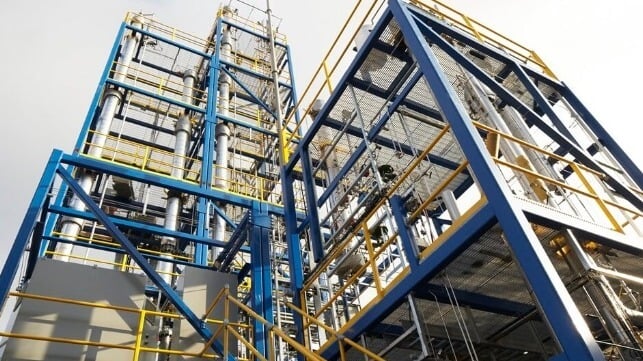Canadian Firm Plans $1.3B Biomethane Plant at Port of South Louisiana

Canadian energy company Woodland Biofuels has reached an agreement to build a $1.35 billion wood waste-to-biomethane plant at the Port of South Louisiana, the firm announced Wednesday. Upon completion, it would be one of the largest renewable natural gas refineries in the world.
The new plant would be located at a multimodal facility at the Port of South Louisiana, and would have financial and workforce support from the State of Louisiana and local partners. If all proceeds as planned, phase one of the project - gas production - could begin as early as 2028.
In a later phase, it would remove hundreds of thousands of tons of carbon dioxide from its chemical process stream and store it underground. The carbon sequestration site would have to be determined at a future date, but Louisiana offers many options: its geology, its existing pipeline infrastructure and its many energy-industry stakeholders make it an attractive destination for carbon storage. The state already has more than 20 carbon sequestration projects in various stages of planning or permitting.
Woodland began operations in the 2010s as a cellulosic ethanol startup, and it built a demonstration-scale plant in Sarnia, Ontario. Its process involves gasification of biomass, and it can capture carbon dioxide during plant operations. Its initial plans called for development of a full scale wood waste-to-ethanol plant in Ontario, coupled with carbon capture and sequestration to make the plant "carbon negative." It secured about CA$5 million in support from the Canadian government to move the full-scale project forward.
"Sarnia is definitely our first choice for a plant location," Woodland CEO Greg Nuttall told the Sarnia Observer in 2021 - though he noted that the Ontario site plan was contingent on finding carbon sequestration capacity. “[Sequestration is] what makes it carbon negative, and it’s just kind of an unknown at the moment whether the infrastructure is going to be there in Sarnia."
Woodland says that the new plan to build a plant in Louisiana would create 110 well-paid new jobs, plus more than 250 indirect new jobs in the region and 500 temporary jobs during construction.
"Our sustainable biofuel plant will be an economic driver for St. John Parish and beyond. We look forward to establishing deep ties with the local community, and drawing on the existing world-class workforce and utilizing Louisiana’s exceptional infrastructure to execute on our project," said Nuttall in a statement Wednesday.

that matters most
Get the latest maritime news delivered to your inbox daily.
According to the Maersk McKinney-Moller Center for Zero-Carbon Shipping, biomethane has strong potential as a renewable fuel for shipping when liquefied into bio-LNG. However, the center's researchers have cautioned that biomethane has the same powerful climate-warming potential as fossil natural gas if it is leaked during production or transport, assuming all else is equal in the comparison.
"One of the main concerns regarding widespread use of methane as an energy carrier is humanity’s scant track record in avoiding anthropogenic methane emissions to the atmosphere, which are currently estimated at 350 million tonnes per year," cautioned the Maersk Center's researchers. "We consider tightening of the regulations in the biogas industry as being of the utmost importance and urgency to ensure that new plants coming into operation have incorporated the right technology to be emissions-free."
